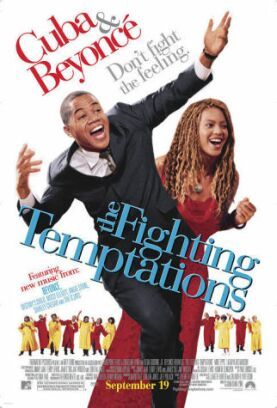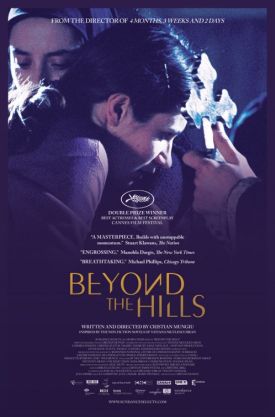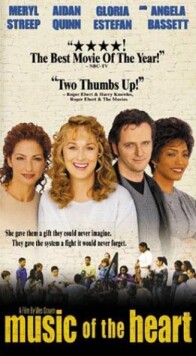Fighting Temptations, The
In the September/October number of Mother Jones, David Hajdu argues that “the blues has grown progressively orthodox, self-referential, and fixated on instrumental technique” — which is to say “more like its miscegenational spawn: pop music of the classic rock-era.” If that bothers him, I wonder what he would say about the gospel music of The Fighting Temptations? Though at times it sounds like traditional gospel, for the most part it is so tarted up with pop and rock and hip hop as to be unrecognizable.
This may be as typical of gospel as it is of blues, or this movie’s version of crossover gospel may just be an attempt to give the movie the wider audience it needs if it is to make money. But if the music is crossover, the humor is less so. It is one of those movies in which the very word “booty” is expected to produce — and, to be fair, in the screening I watched, did produce — gales of laughter.
Darrin Hill (Cuba Gooding Jr.) whose name must have been chosen to remind us of America’s best-known advertising executive, Darrin (or possibly Darren) Stevens, is an ambitious junior executive himself who is detected in a bit of résumé enhancement and forced to leave his job. His boss cites a record of “deception, ambition and an unbridled desire to get what one wants, I think you know what I’m talking about.”
“Yes sir,” says Darrin, apparently in all earnestness: “company policy.”
“No!” says the boss, and then adds: “Well, yes but. . . we cannot have people who tell lies.”
“Sir,” says Darrin, shocked: “we’re in advertising!”
Heading south to Montecarlo, his home town in Georgia after a favorite aunt dies, Darrin finds himself challenged by her will to win a legacy by taking the gospel choir of the Beulah Baptist Church to victory in a competition called the “Gospel Explosion.” But he continues his career of fabrication when he pretends to be a music-producer in order to induce professional- quality musicians to enlist with his choir.
First and foremost on his wishlist, and for more than her voice, is Lilly (Beyoncé Knowles), a single mother who is shunned by the more strait-laced of the congregation, especially Paulina Pritchett (LaTanya Richardson), the formidable sister of the Rev. Paul Lewis (Wendell Pierce). The reverend is accustomed to knuckling under to his strong-willed sister, so a certain amount of such humor as there is depends on their paradigmatic relationship: a matriarchal severity confronting a masculine tendency to look with indulgence on the sins of the flesh.
And the budding relationship between Darrin and Lilly becomes the mirror-image of that parodied in the relationship between Paulina and her weak-willed brother. While Rev. Paul has to learn to stand up to Paulina, Darrin has to allow himself to be cured of his fibbing and put on the right track by Lilly. Naturally, one could hardly expect him to be put right by the religion on whose behalf he is supposed to be making music.
In Hollywood these days, Christianity, is at best a joke. But the church in The Fighting Temptations — purged, of course, of its doctrine and morality — is a useful symbol of community and the honest and decent lives lived in small town America, away from the wickedness of the big city. For that, now that the sexual morality of the city has come to down-home Georgia, advertising has to stand. Darrin’s escape from its clutches may not strike everyone, however, as being from a fate worse than death.
Anyway, movie-goers would do well to heed the warning on the public notice board outside the Beulah Baptist Church of Montecarlo, Georgia: “Beware of brief delight and lasting shame.”
Discover more from James Bowman
Subscribe to get the latest posts to your email.






![Inglorious Bastards [QT, note SP]](https://jamesbowman.net/wp-content/uploads/2009/08/ingloriousbastards.jpg)
